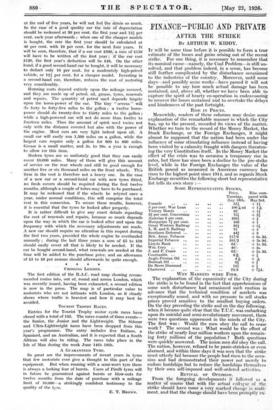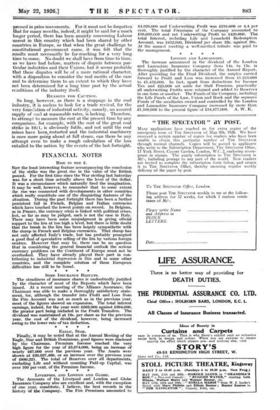• FINAIsICE—PUBLIC AND PRIVATE
AFTER THE STRIKE BY ARTHUR W. KIDDY. .
IT. will be some time before it is possible to form a true estimate of the losses and gains arising out of the recent strike: ' For one thing, it is necessary to remember that its nominal cause—namely, the Coal Problem—is still un- solved,' and that problem indeed, in a sense, has become still' further complicated by the disturbance occasioned to the industries of the country. Moreover, until some days—and possibly some weeks—have passed it will not be possible to say how much actual damage has been sustained, and, above all, whether we have been able to capture- the spirit of hearty co-operation in endeavouring to recover the losses sustained and to overtake the delays and-hindrances 'of the past fortnight.
.- • - . ' - RISE IN PRICES.
- Meanwhile, readers of these columns may desire some eXplanationrof• the remarkable manner' in -which the City has, up to the present, recorded its views of the matter. .Whether we turn to the record of the Money Market, the Stock Exchange, or the Foreign Exchanges, it might almost be supposed that :the nation had been under the influence of some stimulating influence instead of having been visited by a calamity fraught with dangers threaten- ing the very Constitution itself. In the Money Market the effect 'of the ' crisis was to occasion a temporary rise in rates, but there has since been a decline to the pre-strike level, while in the Foreign Exchanges the value of the British pound as measured in American currency has risen to the highest point since 1914, and as regards Stock Exchange securities the following short but representative list tells its own story :- SOME REPRESENTATIVE STOCKS,
'Consols .. .. .. •-• 5 per cent. War Loan • • Price, Tuesday, Nay 18th.
554 100 is xd Rise corn- pared with May 3rd. + 11
+ 1-1V
Victory Bonds .. 93 ± 11 31 per cent. Conversion 751 + 21 Austrian 6 per cent. 1001 -I- 1 Hungarian 74 per cent.
-100 -I- 1
Groat Western Railway .. 881 -F 51 .
L. M. and S. Railway • • 75
+ 4
Southern Deferred .. .. 441 + 3 Brit. Amer. Tobacco .. • • 117/6
-I- Os. 3d.
Imperial Tobacco .. .. 101/3 + 3s. 9d.
Lloyds Bank • • 64/ + 18. 3d.
Wm. Cory .. .. 40/- + 3s.
J. and P. Coats . • 63/ + 2s. 3d.
Courtaulds .. 611 + I Anglo-Persian Oil
4 Irk + Irk
Burmah Oil .. 61 -I- 1 De Beers Diamond .. 141 -I- 1 Chartered .. .. .. .. .. 24/6 + 714.
WHY MARKETS WERE FIRM.
The explanation of the equanimity of the City during the strike is to be found in the fact that apprehensions of some such disturbance had occasioned such caution in advance that fhe technical condition of markets was exceptionally sound, and with no pressure to sell stocks prices proved sensitive to the smallest buying orders. On the day preceding the Strike and On the day following, when it became quite clear that the T.U.C. was embarking upon its suicidal and semi-revolutionary movement, there were two questions uppermost in the minds of the City. The first was : Would the men obey the call to cease work ? The second was : What would be the effect of the strike of nearly four million workers upon the remain- ing forty millions of the population ? Both questions were quickly answered. The union men did obey the call. The nation, however, refused to be panic-stricken or even alarmed, and within three days it was seen that the strike must utterly fail because the people had risen to the occa- sion and had demonstrated their power not merely to endure hardships but to reduce the hardships themselves by their own self-imposed and well-ordered activities.
' REVIVAL OF OPTIMISM.
FroM, the foregoing developments it followed as a matter of ' course that with the actual collapse of.. the strike should have come 'a very marked change in seal:- ment, and that the change Should have'bcev proinptlf ex: pressed in price movements. For it must not be forgotten' that for many months, indeed, it might be said for a much longer period, there has been anxiety concerning Labour unrest in this country which had been shared by other countries in Europe, so that when the great challenge to constitutional government came, it was felt that the results must necessarily be far-reaching for a very long time to come. No doubt we shall have from time to time, as we have had before, matters of dispute between par- ticular industries and their Unions, but it seems probable that these disputes will be of a more rational character, with a disposition to consider the real merits of the case and to determine them to an extent to which they have not been determined for a long time past by the actual ccnditions of the industry itself.
REASONS FOR CAUTION.
So long, however, as there is a stoppage in the coal industry, it is useless to look for a trade revival, for the very foundation of industrial activity, namely, an assured supply of coal at reasonable rates, is lacking. Therefore, to attempt to measure the cost at the present time by any comparison, for example, with the cost of the great coal strike in 1921, is obviously futile, and not until the coal mines have been restarted and the industrial machinery is once more goiiig ahead at full steam, can there be any attempt even to make a rough calculation of the loss entailed to the nation by the events of the last fortnight.















































 Previous page
Previous page